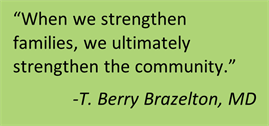Touchpoints Approach
The Touchpoints approach is a strengths-based mindset that family-facing professionals use to engage with families during critical and challenging periods of child and family development. It is a way for professionals to learn the rhythm of the families they are supporting so that we can work alongside them and mirror the families’ own strengths and resources when the family is working through the developmental process.
Healthy child development occurs best in the context of nurturing and responsive  early parent/caregiver relations. Families are facing undeniable stressors and raising children with less structural and social supports than ever before. The Touchpoints approach is a strengths-based mindset that family-facing professionals use to engage with families during critical and challenging periods of child and family development. The Touchpoints approach supports early relational health so that children have a strong foundation for lifelong growth and development.
early parent/caregiver relations. Families are facing undeniable stressors and raising children with less structural and social supports than ever before. The Touchpoints approach is a strengths-based mindset that family-facing professionals use to engage with families during critical and challenging periods of child and family development. The Touchpoints approach supports early relational health so that children have a strong foundation for lifelong growth and development.
The Touchpoints approach, developed by pediatrician T. Berry Brazelton, MD, is a way of providing care to families by understanding development and supporting relationships. Touchpoints are predictable periods in the first years of life, during which spurts in children’s development impact the family system. Knowledge of these touchpoints, and strategies for dealing with them, can help families anticipate and navigate these periods of change. Using relationship-based practices with families supports open communication, promotes mutual understanding, and helps build long-term trusting relationships with families that contribute to a family’s well-being. Touchpoints is not an education-based, imparting of wisdom from the “professional” to the family. Rather, it is a way for professionals to humbly learn the rhythm of the families they are supporting so that we can work alongside them and mirror the families’ own strengths and resources when the family is working through the developmental process. Touchpoints provides strategies to help you through communication and relationship challenges that you may face working with families with young children. With Touchpoints, these challenges can become opportunities for building trust, and strengthening relationships within families and between you and the family.
Touchpoints supports:
- optimal child development
- healthy, functional families
- competent and healthy professionals
- strong communities
Touchpoints-informed practice is proven effective in a variety of organizations and settings, including early care and education centers, pediatric healthcare, mental health, early intervention and home visitation, child welfare, public health, institutions of higher learning, and Tribal communities.
Chloe Leary from the Winston Prouty Center for Child and Family Development in Brattleboro, talks about using Touchpoints as a CIS provider. Click here to watch.
